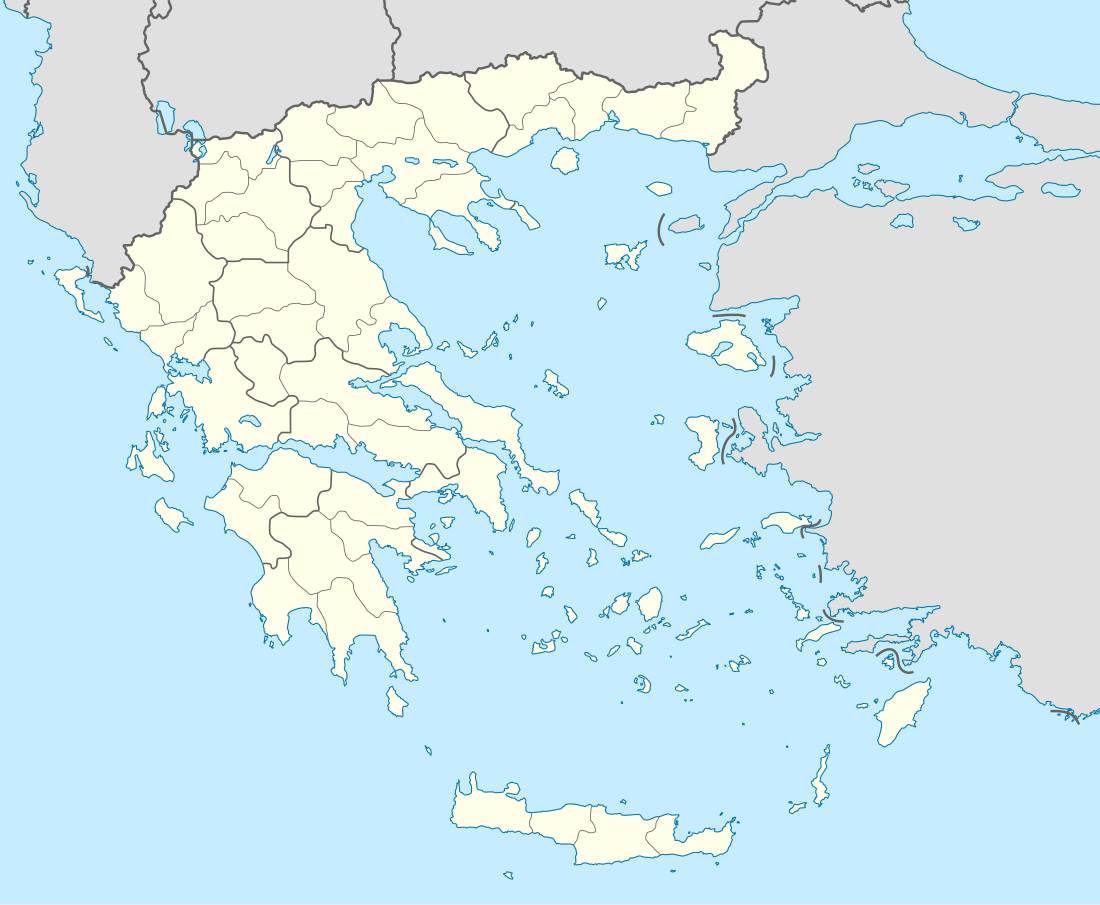Velanidia, Laconia
Velanidia (Greek: Βελανίδια) is a Byzantine village in Laconia, Greece, within the municipality of Monemvasia. Also, it is situated at the southern edge of Peloponnese and more specifically at the southeast edge of mountain range Parnon. It includes several Byzantine churches, so it is often called Small Agios Oros. This village is near Cape Maleas.
Velanidia Βελανίδια | |
|---|---|
 Velanidia | |
| Coordinates: 36°28′41″N 23°08′46″E | |
| Country | Greece |
| Administrative region | Peloponnese |
| Regional unit | Laconia |
| Municipality | Monemvasia |
| Municipal unit | Voies |
| Community | |
| • Population | <100 (2017) |
| Time zone | UTC+2 (EET) |
| • Summer (DST) | UTC+3 (EEST) |
| Postal code | 230 53 |
| Vehicle registration | AK |
History
Velanidia is a Byzantine village, which is obvious because of several churches near by. Established in 1718, this settlement was probably a result of a unification of several smaller settlements, because of the need of a more organized community.
Due to some debris near to Church Saint Greek: Άγιος Panteleimon, we can clearly say that the residents have left there and moved to the current location of the village, probably in 1770. At this point, residents from Spetses came to live at Velanidia because of Orlofika.
So the unification of these two settlements came about, and as a result Velanidia exists. The architecture of the village was clearly influenced by the architecture of islands, because of the small, white houses, and of course, by the marine growth. So far, the most people that are born in Velanidia have a job related with marine (captains, ship mechanics, fishermen).
According to archaeologist Frederick William Hasluck, this region was previously called, Sidi and was situated at the mountain range of Saint Greek: Άγιος George which is at the east of Cape Maleas.
City of Sidi
This old city, which was situated in the place of Velanidia, is said that its name was from the daughter of Danaos, king of Carystos, Evia, who came from the region of Maleas in order to be protected from Hera goddess. According to Pausanias, near to Cape Maleas were two sanctuaries, one dedicated to the god Poseidon, at the west side, and the other, at east side, to Apollo. That to be said, we can assume that near the church of Saint George, we have the sanctuary of Apollo, and so a city of Sidi could exist.
Small Agio Oros
This place was chosen from several, important people related with the Christian (Orthodox) religion, such as Saint George and Saint Thomas from Malea, in order to live in a Monastery near to God (Father of Jesus based on Christianity). At June 1829, French colonel Vincent, returning from Velanidia, said: "It looks like a paint from Van Dyke. Full with lights and behind of it dark clouds. Dressed with shreds and placed at the light come from the rise. I could see him with the diopter looking at the sun and wave to him.."
Moreover, this region was famous as Small Agio Oros, because of its several churches created at the 12th and 13th century.
German Observatory of the Second World War
A complex of military buildings built in 1942 by German people, in order to have the supervision of Balkan and Aegean sea. Its place was strategic, given that you can check the navigation of ships on the Aegean sea and generally what it is moved at the southern part of Peloponnese, Crete, etc. This complex has three main parts; The (A) building, the (B) building, which had the electromechanical installations, the WC building (C), one big, external water tank west of (A) building, a furnace, which was probably for amiant creation due to the erection of the buildings and 4 orthogonial structures, east of (A) building, looking at the sea (we don't know the reason of their creation). West of the complex we have, at least 2 of circular structures, which were probably used as a watchtower in order to observe who is coming from the direction of Neapoli. Some materials were transferred from Piraeus by ship, and the compulsive work of local residents. This building was opted not to be a military building, but an observatory. This assumption was confirmed by many local residents, who had seen the transportation of power generators and lengthy copper wires. All these structures made this complex the perfect place for special military usages.
Geography
The landscape of Velanidia is due to geological actions from the past, on the rocky place inside the cave of Saint Greek: Άγιος John. Nearby, there are ruins came from the 5th to 15th century, which was used for protection. A stream starts from the mountain on Saint John which has several trees and flowers that lead to the sea and specifically to Gialos beach. At the top of the mountain there is a German building from the Second World War, which is named "Ergo", and used as an observatory.
Churches
- Panagia "Myrtidiotissa"
- Assumption of Mary
- Saint John
- Saint Panteleimon
- Saint George
- Saint Paul
- Saints Constantine and Helen
- Saint Myron
- Panagia "Elona"
- Saint Thomas from Malea
- Saint Dominique
Velanidia is distinct because of its Byzantine churches. Churches like those of Saint Constantine, Saint Panteleimon and Saint John have several wall paintings where we can observe the fidelity of figures.
Cape Maleas
From Velanidia you can visit the north side of Cape Maleas and its lighthouse, which was built in 1860 and it's the oldest at Mediterranean sea.
For photos, click here.
External links
- Blog for Velanidia by Baladis (in Greek)
- Syndesmos Velanidiwtwn "Myrtidiotissa" (in Greek)
- Velanidia in Facebook
- Velanidia in Twitter
- Velanidia et le cap Malee, site en francais (in French)